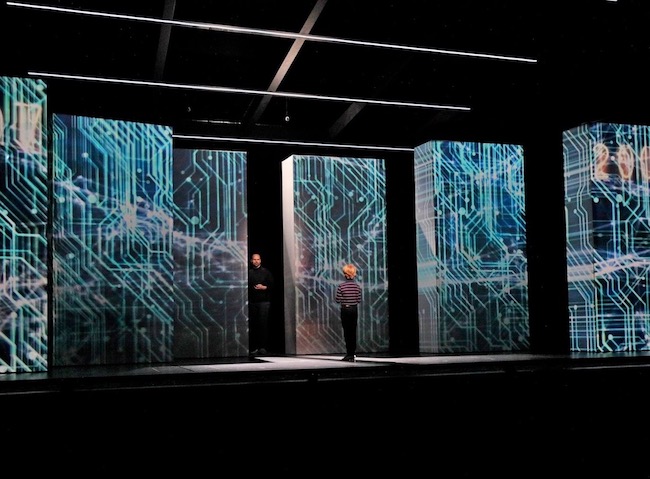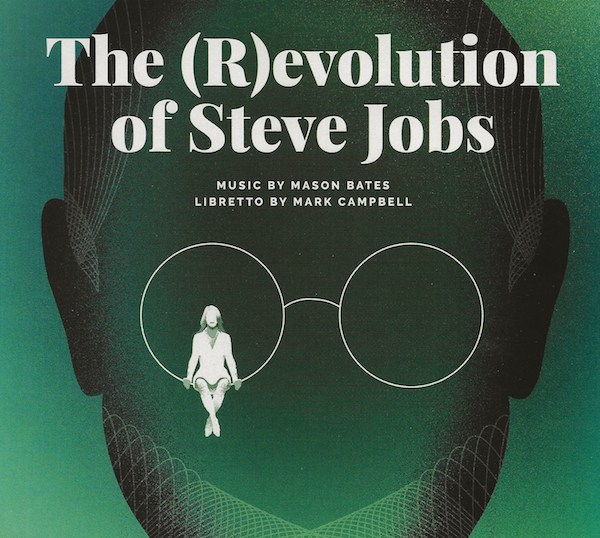A Feel-Good Gloss on the Life of Steve Jobs
The (R)evolution of Steve Jobs – San Francisco Opera – September 2023
Part Disney, part Broadway, and surprisingly enjoyable, the musical theater scored with Hollywood dazzle by Mason Bates to text by Mark Campbell will appeal to new opera audiences, as well as skeptical veterans. San Francisco Opera‘s opening week matinee found a packed house entranced by nimble minimalist sets and the speedway pace of the one hour forty minute bio-opera about a hometown titan. In approaching a tough assignment—crafting a short musical work about a global celebrity, famous in life, famous in death—two obvious paths suggest themselves: take a pivotal moment in the life of the inventor and generate emotional depth, or, surf the entire arc of a life and skim through the salient features. In choosing the latter course, the librettist short-changed the actors but allowed composer Bates full rein to his eclectic orchestral reach. The richly textured score plunges into full orchestra movements, with top notes of electronica and synthesizer sonics. An acoustic guitar adds intimacy and eloquence in the passages where Jobs the ruthless entrepreneur gives way to Jobs the dying penitent.
The music surges in and through an episodic series of biographical snap-shots, from Jobs’ childhood, to the family garage, the corporate miasma, astronomical wealth (and stress), to his desperate embrace of Zen Buddhism and demise due to pancreatic cancer.
 Especially effective are the many passages of Sprachstimme, where for example we watch the young media manipulator Jobs working with his programmer genius partner Steve Wozniak. The two are high on their own ingenuity, the possibilities of this brave new way of communicating they are cooking up in Jobs’ family garage. This scene—one of 19 that comprise the opera—allows for a disarmingly inventive hip-hop duet by the two singers, John Moore as Jobs and tenor Bille Bruley as Woz. Its captivating energy and syncopation bookmark an apex when Apple was in its infancy, and the bloom was still on a creative partnership.
Especially effective are the many passages of Sprachstimme, where for example we watch the young media manipulator Jobs working with his programmer genius partner Steve Wozniak. The two are high on their own ingenuity, the possibilities of this brave new way of communicating they are cooking up in Jobs’ family garage. This scene—one of 19 that comprise the opera—allows for a disarmingly inventive hip-hop duet by the two singers, John Moore as Jobs and tenor Bille Bruley as Woz. Its captivating energy and syncopation bookmark an apex when Apple was in its infancy, and the bloom was still on a creative partnership.
Moving across and around the critical moments of Jobs’ life, the opera embroiders the corporate frenzy with the strained marriage that salvaged what remained of the perfectionist’s humanity. Perhaps in response to the brevity of each scene, the role of Laurene Powell Jobs is reduced to a neglected housewife cliché. Bates has written his best arias around this character, as burnished to high lustre by the voluptuous timbre of mezzo-soprano Sasha Cooke. Moving beyond the expected tessitura, Cooke floated extreme top notes with poignant accuracy and duration of pitch. Like each character in this piece, Cooke is given her own signature leitmotif, a cascade of melisma, remarkably melodic, even romantically figured. Bates wrote for her full range, and the lowest pitches sounded as deep velvet as she sang of her sorrow at her husband’s absence, his neglect. Every scene in which Cooke appeared expanded into flavors of honey and cognac, a ravishing sound that made the listener long to hear this emerging superstar in a much larger, more emotionally detailed role.
Since the librettist provided a check list of greatest moments in the life of Jobs—very much as a Broadway musical might have done—there is as much attention to the role of Zen Buddhism in Jobs’ last years as there is in the call and response of Apple employees against the barking commands of Jobs as corporate czar. Here Bates’ famous kineticism pumps itself up with theatrical juice, creating a propulsive back-beat for the frenetic saga of a genius whose imagination shaped the world—iPhone—we live in. The (R)evolution of Steve Jobs serves up plenty of humorous, intertextual comments about how Jobs urged the world to buy his products, even to the point of breaking through the fourth wall and reminding the audience that as soon as the opera was over they would be reaching for their cell phones.
Shades of Sarastro
Another virtuoso turn is the part of Jobs’ Zen mentor Kobun Chino Otogawa, sung with astonishing tonal purity by Wei Wu. Gifted with an earthy deep bass vocal range, Wu gave surprise, gravity, and plenty of clear-eyed wise-cracking to the flawed seeker. Yet how and how much this Zen persona figured in Jobs’ life remained unexamined, as does almost all of his private choices, passions, habits—except for the shadows in which an early paramour (brightly sung by coloratura Olivia Smith) and the daughter cruelly abandoned by Jobs are given mention. Again, the opera covers so much territory in under two hours that we are left with only rumors of motivation and dimension where there might have been authentic emotional texture.
Many missed opportunities remain in the wings of this invigorating, gravitas-free music theater. The opera creators have chosen to sketch the man for whom all of this is named and explored—Steve Jobs—as an eye-of-the-storm cypher. The main action happens around him, rather than by him. But nimble, appealing John Moore as Steve Jobs, aims his baritone into an attractive bandwidth, and while not a gorgeous muscular voice, it is well up to the task in the middle of the range. Given the fairly flat dramatic material, Moore sculpts a persuasive persona and by the end of the program we are in his corner.
Conductor Michael Christie took full charge of the never-better SFO Orchestra, interbraiding the electronica, solo instruments, and full company into a sparkling, dynamic whole with only occasional bursts of crescendo swallowing the voices.
The stars of the very stylish, state-of-the-art production were set design by Victoria Tzykun, lighting design by Japhy Weideman and production design by 59 Productions. The pulsating LED projections of motherboard circuitry rippling across a field of tall screens was dazzling and effective, sweeping us into the heart of the very heart of the miniaturized computers by which Apple became a household name. Flickering references to Tron and Matrix swelled into gorgeous illuminated abstractions throughout the opera. Projected upon six rotating and moveable rectangles, the lighting design propelled the opera into a rare space of pure energy, glowing spectacle leaving the audience itself with a feel-good glow.
If I were the librettist, I’d workshop this production to find a more logical ending place, rather than having the company, led by Jobs wife/widow Laurene, singing Zen affirmations to us, reminding us to “look up, look out, and look around.” Very PBS Special. This is a wordy opera! The true ending might have been ten minutes earlier, freeing up more time for a deepened middle and a more memorable bio-exploration.
Whether there was, or was not enough to Steve Jobs to generate a full saga remains a question mark.


